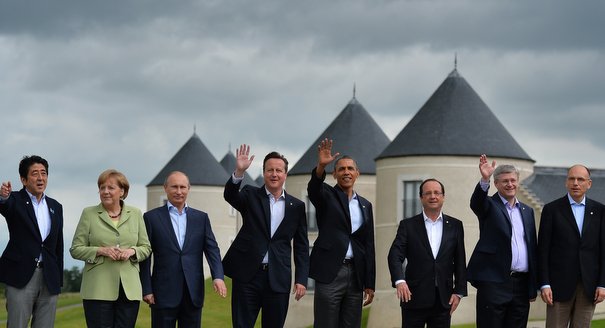Dmitri Trenin
{
"authors": [
"Dmitri Trenin"
],
"type": "commentary",
"centerAffiliationAll": "",
"centers": [
"Carnegie Endowment for International Peace",
"Carnegie Russia Eurasia Center"
],
"collections": [],
"englishNewsletterAll": "",
"nonEnglishNewsletterAll": "",
"primaryCenter": "Carnegie Russia Eurasia Center",
"programAffiliation": "",
"programs": [],
"projects": [],
"regions": [],
"topics": []
}
Source: Getty
What Role for G8?
Each time the leaders of the G8 meet, someone asks the question, does this group still make sense?
Each time the leaders of the G8 meet, someone asks the question, does this group still make sense? The answer was overwhelmingly positive when the leaders of the Western world, then known as the G5, met in 1974. They established a pattern of close interaction on economic matters in an increasingly interconnected world. Politico-military alliances built at the outset of the Cold War were buttressed by a degree of economic and financial governance. Italy’s and Canada’s accession added important economies to the discussion table, but essentially left the nature and purpose of the group unchanged. The transition from the G7 to the G8, still incomplete, was a wholly different matter.
Initially Russia’s membership in the prestigious group was the price U.S. President Bill Clinton was willing to pay to keep Russia within the Western orbit even as he was in the process of expanding NATO, against Moscow’s vehement opposition. As a means of integration, however, the G8 worked rather less well than NATO. The group is essentially a developed countries’ club, which focuses on economy and finance—issues where Russia, when she was admitted, and even now, is in a different category from the G7. As a result, the issues central to the purpose of the G8 are still debated within the G7 framework. As to political issues, Russia, having left the Western orbit a decade ago, is often placed in the position of a contrarian.
The global crisis of 2008 challenged the G8 from the outside. The leaders of the world’s leading industrial democracies had failed to prevent the devastating crisis. Moreover, their own countries were actually the source of the crisis, and their governments’ inability and unwillingness to check the dangerous financial practices made a huge dent in the West’s credibility as the leader of the world. To deal with the crisis, the G8 was too small, and too tainted. The United States government saw this and called in a new group, the G20, composed of a wider group of the leading economies from all over the world. The G20 played a key role in managing the global economic downturn and helping to introduce economic and financial safeguards.
Five years down the road, both groups exist and meet regularly. Neither is perfect. Each has its own advantages and its shortcomings. There is much overlap between the two. The G8 is essentially a subset of the G20. There is a good reason, of course, for the West to meet in its own caucus, and for the leading emerging economies to do the same. A lot can be said in favor of the European Union, or at least the Eurozone countries speaking with one voice in economic global councils. Russia’s position with a foot in either camp is interesting, but it calls for a mediating role, rather than that of a protagonist. Is it time for change?
About the Author
Former Director, Carnegie Moscow Center
Trenin was director of the Carnegie Moscow Center from 2008 to early 2022.
- Mapping Russia’s New Approach to the Post-Soviet SpaceCommentary
- What a Week of Talks Between Russia and the West RevealedCommentary
Dmitri Trenin
Recent Work
Carnegie does not take institutional positions on public policy issues; the views represented herein are those of the author(s) and do not necessarily reflect the views of Carnegie, its staff, or its trustees.